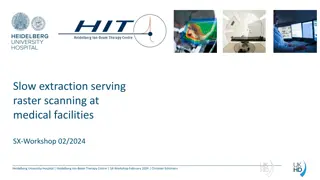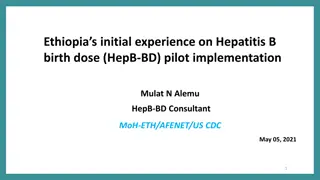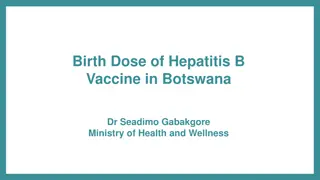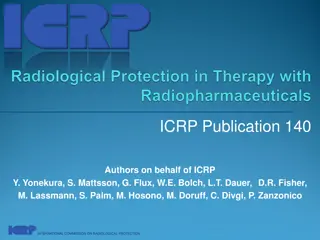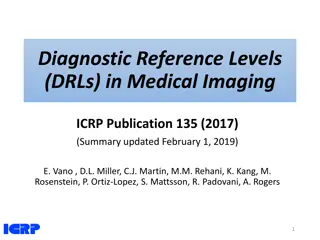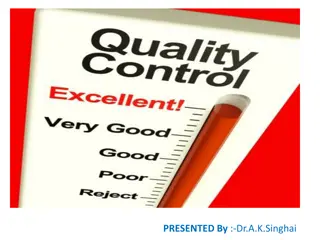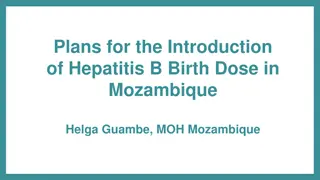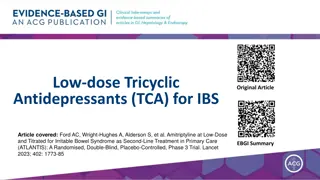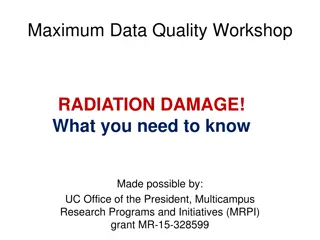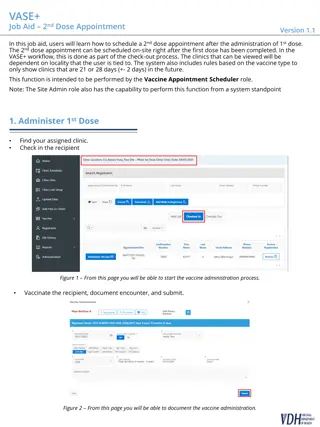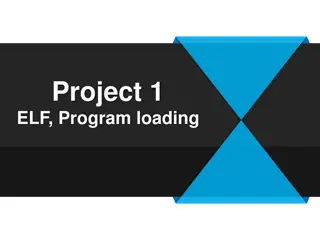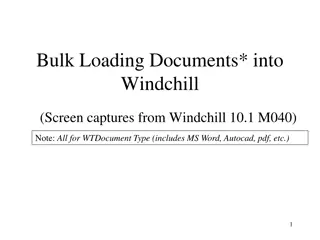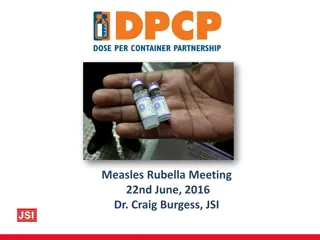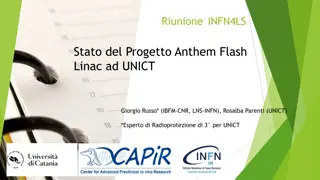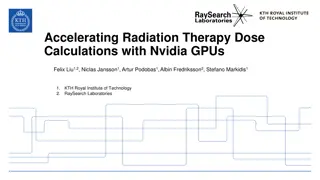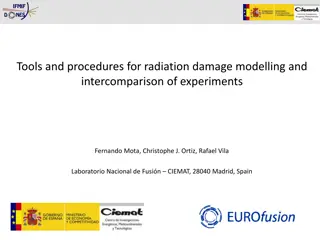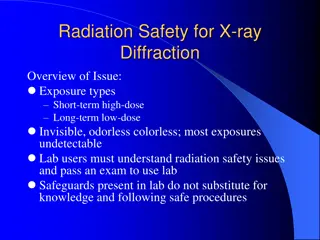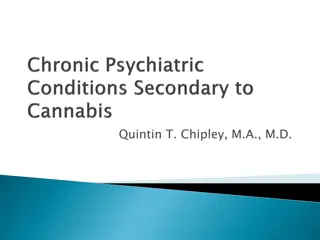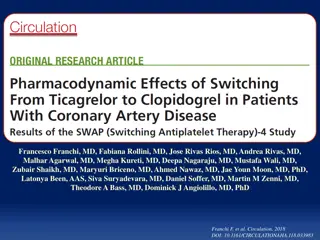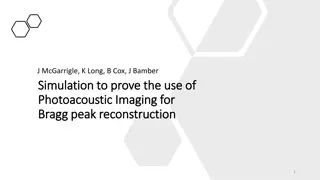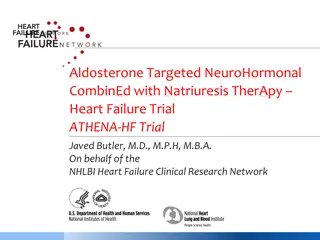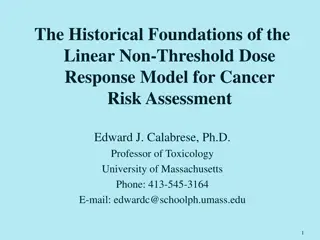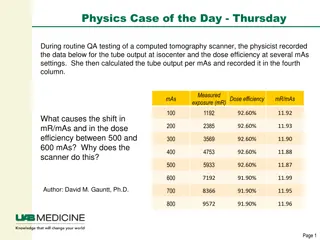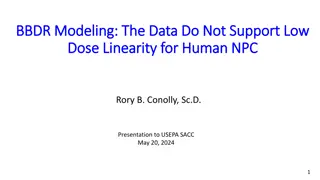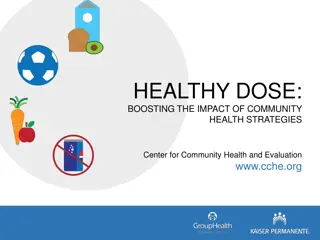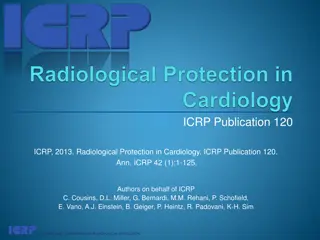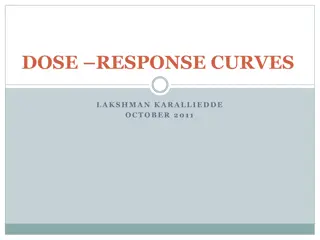Understanding Graded Dose-Response Relationships in Pharmacodynamics
Graded dose-response relationships in pharmacodynamics involve how drug effects depend on concentrations at receptor sites. The potency and efficacy of drugs can be determined through these relationships. Potency refers to the amount of drug needed for a specific effect, while efficacy relates to th
0 views • 32 slides
Advances in Particle Therapy: Slow Extraction and Dose Delivery at Medical Facilities
Medical facilities, like Heidelberg University Hospital, utilize advanced techniques such as slow extraction and raster scanning for precise dose delivery in particle therapy. The demands on these facilities include safe and precise beam parameters, uninterrupted therapy sessions, and fast irradiati
2 views • 23 slides
Understanding Toxicology: Dose-Response and Toxicity Assessment
The study of toxicology involves understanding dose-response relationships, lethal concentrations, tolerance limits, toxicity curves, and factors influencing toxicity. Dose, response, acute toxicity, chronic toxicity, LD50, and ED50 are key concepts in toxicology that help assess the effects of chem
2 views • 24 slides
Ethiopia's Initial Experience on Hepatitis B Birth Dose Pilot Implementation
Ethiopia's initial experience on Hepatitis B birth dose (HepB-BD) pilot implementation includes background statistics, HBsAg prevalence, hepatitis B vaccination coverage, distribution of HBV infection, existing guidelines/strategies, and activities prior to the start of HepB-BD piloting.
0 views • 17 slides
Updated Vancomycin Collaborative Practice Guidelines in 2020
Vancomycin guidelines updated in 2020 include transitioning from trough-based to AUC-based monitoring, emphasizing achieving an AUC/MIC of 400-600 for improved outcomes. Major updates involve loading dose adjustments, targeting AUC/MIC instead of trough levels, and pharmacist-orderable MRSA nasal sw
0 views • 38 slides
Improving Hepatitis B Birth Dose Vaccination in Botswana
Hepatitis B vaccination coverage in Botswana faces challenges like poor documentation and premature infants not receiving the birth dose. Opportunities for improvement include enhancing data collection, evaluating the immunization program, and strengthening perinatal committees for quality care.
0 views • 9 slides
Quantitative Imaging and Dosimetry for Radiopharmaceutical Therapy Planning
This presentation highlights the importance of quantitative imaging and dosimetry in planning radiopharmaceutical therapy. It emphasizes the need for individualized dosimetry to tailor treatment procedures and verify the absorbed dose delivered. The content discusses the framework provided for treat
0 views • 34 slides
Diagnostic Reference Levels in Medical Imaging and Radiation Protection
The concept of Diagnostic Reference Levels (DRLs) is crucial in evaluating the amount of ionizing radiation used in medical imaging procedures. DRLs help determine if radiation levels are appropriate and need optimization. Authorized bodies establish numerical DRL values as advisory guidelines. Loca
1 views • 26 slides
Overview of Pharmaceutical Packaging: Basic Terminologies, Quality Control Tests, and Container Types
Pharmaceutical packaging plays a crucial role in maintaining the effectiveness and safety of medications. This content delves into basic terminologies, quality control tests for containers, closures, and secondary packaging, as well as an introduction to general packaging practices. It also covers t
0 views • 35 slides
Introduction of Hepatitis B Birth Dose in Mozambique: A Step Towards Comprehensive Prevention
Mozambique is gearing up to introduce the Hepatitis B birth dose as a strategic approach in its immunization program, aiming to tackle the high prevalence of HBV within the population, particularly among women and HIV-positive individuals. The country's existing policies on screening pregnant women
0 views • 15 slides
Low-Dose Tricyclic Antidepressants (TCA) for IBS: ATLANTIS Study Overview
The ATLANTIS study evaluated the efficacy of low-dose amitriptyline (10-30 mg) in improving Irritable Bowel Syndrome (IBS) symptoms compared to placebo in a 6-month randomized controlled trial in a primary care setting. This important research aims to address the lack of definitive treatment guideli
0 views • 12 slides
Understanding Biological Effects of Radiation in Radiation Biology Lecture
This lecture by Dr. Zaid Shaker Naji delves into the biological effects of radiation, including deterministic and stochastic effects. It covers mechanisms of damage at the cellular level, such as direct and indirect damage, and discusses somatic and genetic damages that can arise following exposure.
0 views • 10 slides
Understanding Quantitative Aspects of Drug Action
Explore the quantitative aspects of drug action, including drug receptor binding, concentration binding curves, dose-response curves, and types of antagonism. Learn to relate drug concentration to receptor binding capacity and response produced. Discover how concentration binding curves and dose-res
0 views • 29 slides
Understanding Radiation Damage in Crystallography
Explore the impact of radiation damage on crystallography, focusing on dose proportional to photons per area rather than time or heat. Learn about MGy, radiation damage world records, crystal lifetime based on flux and dose, and self-calibrated damage limits. Discover insights from various studies a
0 views • 71 slides
Estimation of Radiation Dose Due to Thoron and Progeny Inhalation in Odisha, India
This study conducted in the Eastern Coastal Area of Odisha, India, focuses on estimating radiation doses resulting from thoron and progeny inhalation in a high natural background radiation environment. The research explores exposure to thoron, its progeny, dose conversion factors, experimental techn
0 views • 17 slides
Understanding Faculty Loading for Courses with Labs
This content provides valuable insights into the faculty loading criteria for courses with labs at San Antonio College, covering definitions of open and instructional laboratory courses, Alamo Colleges District policies, examples of lab loading, and discussions on pay inequity related to workload un
0 views • 8 slides
VASE+ Job Aid 2nd Dose Appointment Scheduling
Users will learn how to schedule a 2nd dose appointment after administering the 1st dose in the VASE+ workflow. The process involves identifying the recipient needing the 2nd dose, selecting a suitable clinic date, verifying recipient information, choosing an available appointment slot, and confirmi
0 views • 6 slides
Understanding Project Loading Processes in ELF Programs
Explore the intricate processes involved in loading ELF programs, from reading executable files to loading program segments and processing user commands. Dive into the details of ELF headers, program headers, memory allocation, and creating user contexts for executing programs. Gain a deeper underst
1 views • 20 slides
Bulk Loading Documents into Windchill - Step-by-Step Guide
Learn how to bulk load documents into Windchill using screen captures from Windchill 10.1 M040. This detailed guide covers all you need to know about bulk loading documents and parts, including saving files in CSV format, converting to XML, and loading files into Windchill server. Follow the step-by
0 views • 8 slides
Understanding Trade-offs in Multi-Dose Containers for Vaccine Distribution
In a measles and rubella meeting in June 2016, Dr. Craig Burgess discussed the impact of Multi-Dose Containers (MDCs) on system performance and cost trade-offs. The phases involved evaluating evidence gaps, considering factors like price per dose, health system impact, and wastage rates. The analysi
0 views • 16 slides
Choosing Parameters for Electron-Beam Lithography with the Raith EBPG
In the process of electron-beam lithography with the Raith EBPG, selecting parameters such as resist type, resist thickness, spot size, dose range, resist sensitivity, and beam step size is crucial for achieving precise patterns. Factors like the substrate, developer, and pattern transfer technique
0 views • 9 slides
Status of Anthem Flash Linac Project at UNICT
Detailed insights into the Anthem Flash Linac project at UNICT including machine characteristics, source features, shielding calculations, installation site, and potential configurations. Emphasis on radioprotection aspects, primary electron radiation, X-rays, bremsstrahlung field, and shielding req
0 views • 18 slides
Accelerating Radiation Therapy Dose Calculations with Nvidia GPUs
Accelerating Radiation Therapy Dose Calculations with Nvidia GPUs by Felix Liu, Niclas Jansson, Artur Podobas, Albin Fredriksson, and Stefano Markidis discusses the utilization of GPU technology to improve efficiency in radiation treatment planning. The process involves creating patient-specific tre
0 views • 18 slides
Understanding the Oxford-AstraZeneca Vaccine: Benefits, Risks, and Recommendations
The Oxford-AstraZeneca vaccine has shown a likely but unproven link to cerebral venous sinus thrombus and other blood clotting issues. Despite this, the benefits of vaccination still outweigh the risks, with only approximately 4 cases per million resulting in death. Communication of the potential be
0 views • 10 slides
Importing and Loading ASSIST Data into Banner - CISOA/3CBG Conference 2014
Overview of the process involved in importing XML transcripts and loading ASSIST data into Banner for the CISOA/3CBG Conference 2014. The presentation covers two technologies used, Banner setup, XML XSL translation, data source details from eTranscriptCA (California Transcript Exchange), loading ASS
0 views • 25 slides
Tools and Procedures for Radiation Damage Modeling and Intercomparison of Experiments
Calculation and comparison of radiation damage under different irradiation conditions to assess the impact on materials. Various factors affecting damage dose are considered, including atomic displacement, PKAspectrum calculation, simulation of irradiation processes, and identification of impurities
0 views • 6 slides
Understanding Radiation Safety for X-ray Diffraction in Labs
Exposure to X-ray radiation in laboratories poses short-term high-dose and long-term low-dose risks, which are invisible and undetectable. Lab users must comprehend radiation safety principles, pass exams, and adhere to safe practices. Safety requirements include passing a radiation safety exam cove
0 views • 20 slides
Lake Washington PCB/PBDE Study Estimates and Loading Pathways
This study presents estimates of loading of PCB/PBDE pollutants in Lake Washington from major pathways, including rivers, local drainages, and monitored tributaries. The data shows current PCB loading estimates to Lake Washington and its exits to Puget Sound, providing insights into sources and conc
0 views • 12 slides
Understanding Psychotic Disorders and Cannabis Effects
Quintin T. Chipley, M.A., M.D., discusses the impact of cannabis on psychotic disorders, highlighting studies linking cannabis use to increased risk of psychosis. The presentation delves into the dose-dependent and age-dependent effects, the role of THC and Cannabidiol in mind-altering experiences,
0 views • 17 slides
Pharmacodynamic Effects of Switching from Ticagrelor to Clopidogrel in Patients with Coronary Artery Disease: SWAP-4 Study
Pharmacodynamic effects of switching P2Y12 inhibitors from ticagrelor to clopidogrel in coronary artery disease patients were investigated in the SWAP-4 study. De-escalation between these agents is common for various reasons. The study assessed the impact of clopidogrel loading dose, maintenance dos
0 views • 11 slides
Simulation Study of Photoacoustic Imaging for Bragg Peak Reconstruction
This study explores the use of simulation in Photoacoustic Imaging for reconstructing the Bragg peak in proton therapy. It discusses the concept of Photoacoustic Imaging, the generation of acoustic waves from pulsed electromagnetic radiation, and the experimental setups for characterizing proton dos
0 views • 13 slides
Study on High-Dose Spironolactone in Acute Heart Failure Patients
The ATHENA-HF trial investigates the impact of high-dose spironolactone on reducing NT-proBNP levels in acute heart failure patients. Key objectives include assessing congestion, dyspnea relief, urine output, weight change, diuretic requirement, and outcomes like mortality and readmissions up to 60
0 views • 20 slides
Historical Foundations of the Linear Non-Threshold Dose Response Model
The journey of the Linear Non-Threshold (LNT) dose response model for cancer risk assessment unfolds through the work of scientists like Muller, Timofeeff-Ressovsky, Zimmer, and Delbruck. Muller's initial gene mutation research led to the acceptance of LNT, which was further integrated with the sing
0 views • 45 slides
Understanding Dose Efficiency in Computed Tomography Imaging
The physicist conducted testing on a computed tomography scanner to analyze the tube output and dose efficiency at various mAs settings. The shift in dose efficiency between 500 and 600 mAs is due to the use of different focal spots and collimator adjustments. When the collimator accommodates the la
0 views • 6 slides
Validation of Plasmalyte in Cordwashing - Cord blood processing and quality control
This detailed documentation covers the validation process of using Plasmalyte in cord blood washing procedures, providing insights into the reasons for washing cord blood units, current standards, acceptance criteria, and the use of validated methods like Sepax cord wash. It emphasizes the importanc
0 views • 16 slides
Analysis of BBDR Modeling for Human NPC Dose Linearity
The BBDR modeling for human NPC dose linearity is examined through various studies and updates from 2003 to 2024. Key aspects include formaldehyde BBDR, regulatory acceptance/rejection, EPA/IRIS concerns, and the 2023 BBDR model update addressing main issues. The 2023 BBDR model presents two version
0 views • 10 slides
Enhancing Community Health Strategies with Dose Methodology
Boost the impact of community health strategies by implementing dose methodology to measure reach and strength of interventions. Calculate population-level impact to improve community health behaviors and outcomes effectively.
0 views • 12 slides
Understanding Dynamic Loading and Linking in Memory Management
This presentation covers the concepts of dynamic loading and linking in memory management, discussing how programs and data are managed in physical memory, the advantages of dynamic loading, and the process of dynamic linking for system language libraries. The use of stubs for locating memory-reside
0 views • 12 slides
Radiation Protection in Cardiology: Guidelines for Patient Safety
Patient radiation exposure in cardiac procedures, particularly in nuclear medicine, CT scans, interventional cardiology, and electrophysiology, can lead to skin injuries and increased cancer risk. It is crucial for healthcare providers to be aware of radiation risks, follow professional guidelines,
0 views • 25 slides
Understanding Dose-Response Curves in Pharmacology
Dose-response curves play a crucial role in pharmacology by illustrating the relationship between drug dosage and its effects. Researchers use these curves to determine potency, efficacy, and safety of drugs, helping to establish the required dose for desired outcomes. By comparing pharmacologic pro
0 views • 13 slides

